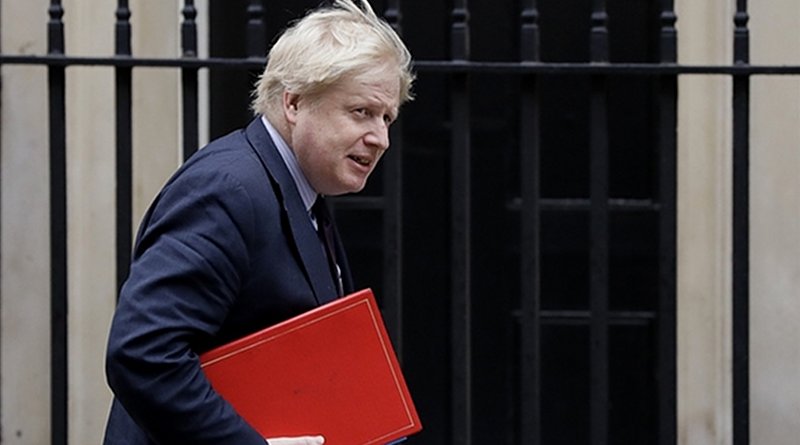Boris Goes To Washington – OpEd
By Arab News
By Andrew Hammond*
Boris Johnson is finalizing plans with Donald Trump for a trip to Washington next month. While the visit will be designed to showcase personal warmth between the two, it comes at a tricky time.
Most immediately, the proposed UK digital tax is causing diplomatic waves. UK finance minister Sajid Javid last weekre-affirmed his intent to move ahead with the tax; France and other European countries are also seeking to ensure technology firms, most of them American, pay their fair share of tax in countries where they operate.
Many such tech companies argue that taxes should be payable not where they have their European headquarters, but where digital activity takes place. Both Trump and Treasury Secretary Stephen Mnuchin have supported this, andMnuchin has threatened retaliation against the UK with tariffs on its cars imported into the US.
Security and defense have long been at the core of the US-UK relationship, but there are tensions there too. Washington has warned UK officials that it may limit intelligence sharing if London allows the Chinese company Huawei to build part of its 5G high speed mobile network. Johnson is expected to award the contract to Huawei in days, which would be a high-stakes diplomatic gamble for London given its desire to form closer post-Brexit economic ties with both Beijing and Washington.
Beyond security issues, there are also US-UK disagreements on wider foreign policy challenges, such as Iran, andclimate change. This year is the fifth anniversary of the 2015 Paris climate change agreement, and the Johnson government is chairing the annual UN climate meeting in November amid significant pressure to make major progress on implementing Paris commitments.
The two-week UN summit in Scotland is already being billed as the most important climate gathering since 2015, with about 200 world leaders attending. The meeting, just after the US presidential election, could therefore be a crossroads in the battle against global warming.
With Trump in power until at least 2021, one of the key tasks will be seeking to bring the US president into, or neutralise his opposition to, any bold new action on climate change. This will not be easy, especially in light of his remarks last week about environmental “prophets of doom.”
It is in this context, with the UK leaving the EU in days, that Johnson’s visit is being planned for next month. Following Trump’s cool relationship with Theresa May, it has been widely assumed that her more colorful replacement can rejuvenate the so-called special relationship. But while Johnson and Trump appear to get on quite well, the prospects for the relationship are uncertain given the US president’s erratic nature, and key differences between the two sides over their post-Brexit relationship.
To be sure, it is clear that Trump and Johnson see a potential, post-Brexit, US-UK trade deal as the cornerstone of a renewed “special relationship,” and this could also be a boon for Trump personally given that he is criticized as an anti-globalization, protectionist president. From the standpoint of Brexiteers too, including Johnson, this would also represent a win in their own battle to show that the nation can swiftly secure trade deals with key non-European partners.
There are also key areas ripe for agreement here, such as lowering or eliminating tariffs on goods. Equally, however, possible icebergs lie on the horizon. They include the prospect that harmonising financial regulations, with the international dominance of Wall Street and the City of London, will not necessarily be straightforward. Securing agreement in other sectors, including agriculture, where there are divergences of views and strong interest groups, will also not be easy. As last month’s UK election campaign showed, there are also UK political concerns that the nation’s much cherished National Health Service could be part of the agenda here for US healthcare firms.
Given the multiple uncertainties ahead in the Trump presidency, Johnson is likely to continue to seek to play the role of a trusted friend in a bid to get close to the president to try to make the relationship work as smoothly as possible. This may provide some protection in what could be a rocky period of international relations in the early 2020s.
While this may be a sensible strategy, at least initially, it is not without risk, especially given Trump’s mercurial behavior and polarized standing in UK opinion. While seeking the upside in the new relationship, Johnson would do well not to overestimate the UK’s ability to shape US power, nor neglect the likelihood that when push comes to shove, Trump’s “America First” outlook may care little for core UK interests, whatever personal affinity they have for each other.
- Andrew Hammond is an Associate at LSE IDEAS at the London School of Economics

